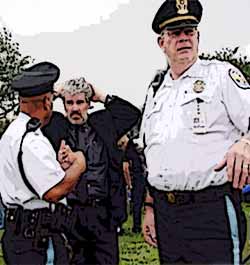False
Arrest
False arrest refers to a situation when
a person will claim that they were detained without good reason
or without an order given by the court. Individuals in law enforcement,
such as police officers, are sometimes subject to cases of false
arrest but the majority of cases are usually held against private
firms.
There are a few cases in which someone can legally place another
person under arrest. Anyone who has a legal arrest warrant has
the authority to arrest someone. This includes bounty hunters
who act under the authority of the court, and allows them the
right to bring in an individual who has not paid bail. Bounty
hunters are allowed to arrest such individuals to bring them to
trial.
Police officers usually have far more rights than those of citizens
when making arrests. However, the rights of police officers making
an arrest do have their own boundaries and limitations.
A police officer also has the right to make an arrest providing
that they have just cause that the person they are arresting has
been involved in illegal activity. In the case of a misdemeanour,
or other minor offence, the officer only has the authority to
arrest the person for the period of time that is required to identify
them and issue them a summons to appear in court. The office may
only hold the individual longer if the officer believes that the
person will not reply to the summons.
Any individual may also arrest someone if it is suspected that
person has committed a felony and the arresting person believes
that the suspected person will attempt to leave the scene of the
felony. An individual cannot be held under arrest based only on
a suspicion they have committed a felony unless the arresting
person has an arrest warrant.
The majority of cases of false arrest are cases involving shoplifting
and are held against private security companies and stores. A
security guard working for a private security company does not
have the authority to arrest someone based on a suspicion that
the person is likely to commit a crime. In most cases, there must
be some proof that the illegal act has already been committed.
For instance, the person must actually try to exit the store without
paying for the items they have stolen.
Bounty hunters cannot arrest anyone outside of the United States.
American bench warrants are valid in any state. However, in Canada
and Mexico, only law enforcement officials are authorized to execute
bench warrants.
There have been a few cases where the arresting officer or bounty
hunter has made a lawful arrest against the wrong person. Most
false arrest suits result in high damages awarded to the plaintiff
against the officer. However, there have been cases where the
false arrest suits result in only nominal damages.
|


